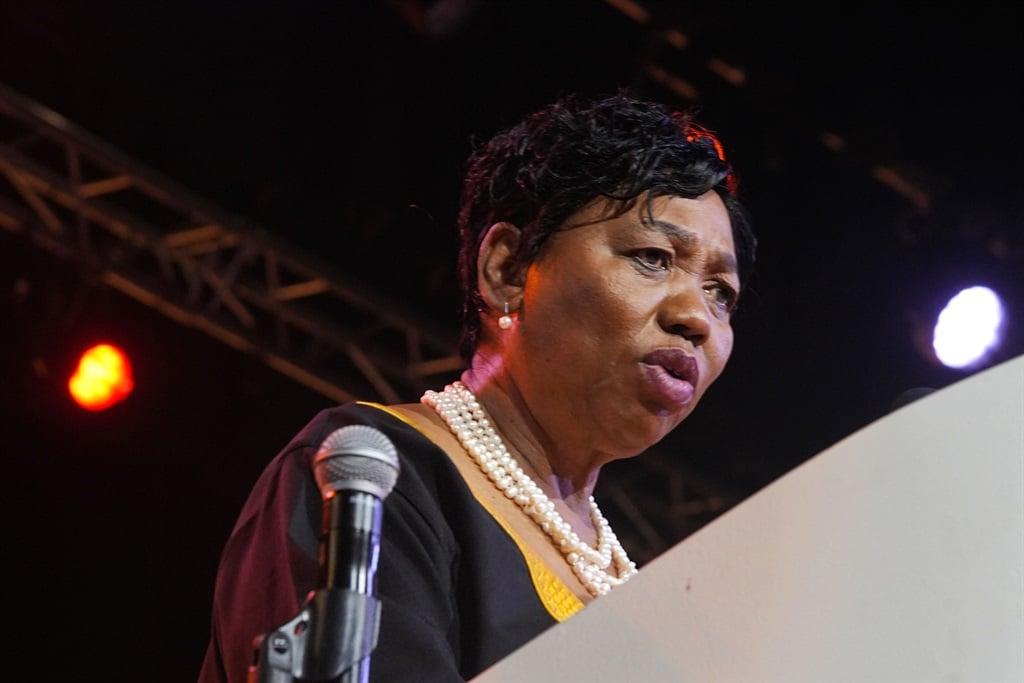Africa-Press – South-Africa. While the ANC study group on basic education lauded Basic Education Minister Angie Motshekga for the recent matric results, the DA issued her with a “report card”, saying there is “room for improvement”.
The ANC study group – the party’s MPs serving on the Portfolio Committee on Basic Education – said in a statement that it is “elated by the significant improvement in performance by the matric class of 2022 across provinces”.
“The matric class of 2022 is a historic cohort because the coronavirus pandemic significantly impacted its progression in Grades 10 and 11. They were also affected by the recent disruptions caused by load shedding. This cohort has demonstrated the youth’s resilience and commitment to learning.
“Their performance is a testament to the Department of Basic Education’s tremendous work in ensuring curriculum recovery and continued learning under difficult conditions,” reads the statement by Nombuyiselo Adoons, the ANC whip in the committee.
“We commend the work of Minister Angie Motshekga, the Deputy Minister, Dr Reginah Mhaule, MECs in all nine provinces, and the department staff for their efforts and commitment to strengthening our education system.”
The study group said they “appreciate” the improvement in the 2022 National Senior Certificate (NSC) pass rate of 80.1% from 76.4% in 2021.
“The department must sustain this positive trajectory. We are thrilled that the percentage of bachelor’s passes of learners from ‘no fee’ schools has increased by 13.4% from 2021. This is a qualitative improvement signifying progress in improving the conditions of the poor through education,” it said.
“We welcome the overall increase in performance of all provinces, particularly the significant increases in KwaZulu-Natal by 6.2%, Limpopo by 5.3%, and Eastern Cape by 4.2%. We also applaud the Free State for consistently being the best-performing province for consecutive years.”
Less impressed was the DA spokesperson on basic education, Baxolile Nodada, who also serves on the committee.
In a statement of his own, he said it is “only fair” Motshekga’s efforts are also being evaluated.
For “foundation phase outcomes”, he gave her a D, saying: “Due to continuous Covid-19 lockdowns and the disruptions to education, learners are up to two years behind in literacy and numeracy skills.”
For “teacher development”, he gave Motshekga an F.
According to Nodada, there were 1 575 unqualified and under-qualified teachers teaching in classrooms in 2022.
“A SACMEQ [Southern and Eastern Africa Consortium for Monitoring Educational Quality] study that measured teacher knowledge revealed that South Africa does not measure up to its African counterparts. South African teachers struggled to pass tests in the subjects they teach with Grade 6 teachers achieving results of less than 50% – 41% for mathematics, 37% for reading subjects,” he said.
He added that the Auditor General found that the South African Council for Educators “struggled to produce credible performance reports”.
Nodada gave Motshekga another F for “dropouts” – a perennial concern for the DA.
“Dropouts remain a major problem. The real 2022 matric pass rate was a mere 54.6%, with a dropout rate of 31.8%,” he said.
Motshekga got another F for “school safety”.
“Second quarter crime statistic for 2022/23 revealed 83 rapes and 19 murders committed at primary, secondary and high schools, daycare facilities, special schools and tertiary institutions,” said Nodada. “258 cases of assault/grievous bodily harm and 22 cases of attempted murder occurred on educational premises.”
Motshekga’s marks, as awarded by Nodada, improved with “mother tongue education”, for which he gave her a C.
“Despite numerous local and international studies showing the benefit of mother tongue education, it remains a contentious issue with comparatively few schools with a single medium school of instruction, especially in the indigenous languages,” he said.
“Strides towards the expansion of mother tongue education have been made with isiXhosa and Sesotho being piloted as language of instruction beyond the foundation phase in the Eastern Cape.”
For “quality of education”, Nodada gave Motshekga a D.
“Minister Motshekga has ample room for improvement. Although her department has a number of worthy initiatives, they will not succeed without focus and a concerted effort to address and solve the numerous serious concerns plaguing the South African education system,” Nodada said.
For More News And Analysis About South-Africa Follow Africa-Press






